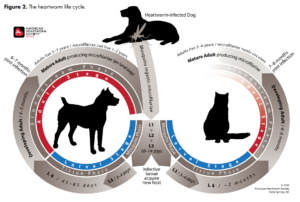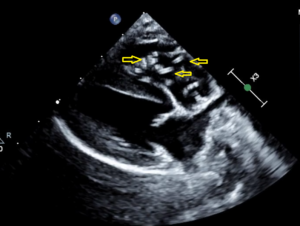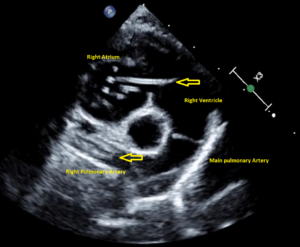Heartworm disease, caused by the parasite Dirofilaria immitus, is an all-too common and potentially devastating disease of dogs and cats. It is estimated that approximately ONE MILLION dogs and cats in the US are infected with this parasite, and many may not have symptoms of the disease until the damage has been done. This parasite is transmitted by mosquitos, which inject their infected larvae into pets during a blood meal. These baby worms (called microfilaria) migrate through the tissues as they become adult heart worms. They eventually come to reside in pulmonary arteries, which are the large blood vessels which carry blood to the lungs. The adult worms can live for many years, and while they are present, they are causing damage to the lining of the blood vessels in the lungs. This can result in coughing, pulmonary hypertension (high blood pressure in the lungs) and congestive heart failure. In severe cases, the worms can be so numerous that they migrate into the heart itself, where they cause damage to the red blood cells resulting in a life-threatening surgical emergency called Caval Syndrome. This syndrome, if not treated by surgical worm removal, is fatal within days of the onset of symptoms.

Once infected, these pets can pass on the disease if they are fed on by mosquitos. Treatment for heartworm infection includes monthly preventative medications, antibiotics that target bacteria which the worms need to survive, and multiple injections of a harsh parasiticidal chemical. During the months of treatment, pets need to be strictly confined to a cage and not allowed to exercise or play, as this can result in death from worms being broken up and sent into circulation (called embolization). While treatment is very successful, some patients do not survive treatment, and often, severe damage to the lungs has already been done.
Luckily, there are many monthly preventative medications available from your family veterinarian which are extremely effective at preventing heartworm infection. While heartworms can only be spread when mosquitos are present, in this part of the country, we recommend year-round administration of heartworm prevention to reduce the risk of contracting this disease.
Our Cardiology specialists at Friendship Hospital for Animals are up to date on the most current heartworm preventative and treatment strategies. We also have specialized equipment needed for surgical heartworm removal, if this becomes necessary. Please contact us if your pet has been diagnosed with heartworm disease and you would like to discuss treatment options!
If you are interested in learning more about heartworms, please visit the American Heartworm Society website, where there are numerous resources for both owners and veterinary professions can be found.



Dr. Chris McLaughlin is originally from Woodstock, New Brunswick, Canada. He attended the Atlantic Veterinary College, followed by an Internship at the Ontario Veterinary College. He completed a residency in Emergency and Critical Care from North Carolina State University in 2016, before moving to South Florida to practice in two, large referral hospitals. During his time as a Director of Emergency and Critical Care, he developed a passion for minimally invasive interventional procedures. This led him to undertake a second residency in Cardiology at North Carolina State University, which he completed in July 2023.
